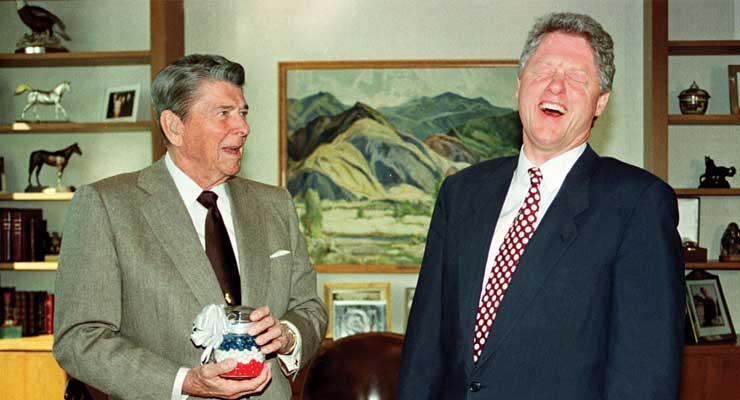
Despite the perception that former Presidents Ronald Reagan and Bill Clinton are polar opposites, the rise of both of these world leaders is mirrored in that both were elected during times of great economic instability, singled out to halt the fiscal chaos that had been unfolding. Their administrations, as a result, put in a great amount of effort to solve the grave economic problems that had been grappling the American people, implementing and designing idiosyncratic economic policies and theories from the ground up. As the presidential election year progresses, with Bill Clinton heavily involved in Hillary’s campaign and Republicans competing to paint their ideas as most identical to those of Ronald Reagan, it is an appropriate time to portray the revolutionizing economic policies that these two presidents had developed.
Let’s begin with the clear distinctions. While Reagan’s economic theory had revolved around a small government in terms of fiscal regulation, Clinton’s was essentially a collaborative effort using both fiscal conservatism and incremental government activism. Also unlike Clinton, Reagan embraced supply-side economics, apparent in his belief that cutting taxes would lead to more business investment, and thus, an increase in the creation of jobs, tax revenue, and fiscal circulation. In theory, while Clinton drove up employment and exportation to suit a changing global economic landscape, Reagan supported cutting taxes and governmental programs so businesses and individuals can flourish and be encouraged to further invest in the economy. And while Reagan believed federal programs should be minimized in order to put more money towards the military, Clinton embraced welfare reforms.
But Reaganomics and Clintonomics are essentially paralleled in terms of the emphasis on deregulation. Just as Reagan focused on fighting inflation and reducing the burden businesses and individuals felt financially due to the government and its taxes, Clinton focused on balancing the budget and encouraging free enterprise with a revolutionized federal government that granted local and state powers more control.
Zeroing in on two specific examples in which these somewhat blurry economic philosophies come to life, the NAFTA bill and Reagan’s tax cuts as separate incidents each allow a clear understanding of the way Clinton and Reagan respectively had attempted to implement their economic policies.
Starting with Reagan, his overall economic strategy was exemplified in the passing of the Economic Recovery Act of 1981, which was was an across-the-board decrease in income tax rates by 23% over a three-year period, with the top rate falling from 70% to 50% and the bottom rate dropping from 14% to 11%. This act also slashed estate taxes and trimmed taxes that business corporations were required to pay by a startling $150 billion over a five-year period. Meanwhile, Clinton’s North American Federal Trade Agreement was designed to create a trade bloc for Mexico, the United States, and Canada.
This bipartisan effort was an attempt to increase exports and continue the expanding role of the United States in a modern, globalized economy, a clear reflection of Clinton’s economic agenda. Clinton was in favor of this trade policy because it allowed for a freer, more open system to operate, in which the federal government partook in the loosening of the economic system to facilitate trade. Clinton’s support for this policy also reflects his belief in developing more jobs by opening up the market to increase potential customers for the United States.
Regardless of the specifics, the legacies of these ideological developments in response to a need to revive the American economy are monumental. Ronald Reagan’s economic policy has without an ounce of doubt progressed into the basic platform that the conservatives in the Republican Party hold in high regards today, while Bill Clinton’s has transformed into the quintessential ideology that liberals tend to deem the most pragmatic and resourceful, though not necessarily the most representative of their beliefs.
And to build on that last note, the Democratic Party has over the years evolved away from Clinton’s agenda, with only certain elements having been extracted. What had been progressive in the 1990s for the general does not hold true today. For individuals of the more progressive wing of the party, like Bernie Sanders and Elizabeth Warren, Clinton’s way of handling the economy is simply insufficient.
This change is a harsh reality that Hillary Clinton has specifically had to deal with on the campaign trail, as she has faced strong backlash for flip-flopping to appear more progressive, especially when her opponent has been for more than three decades consistent in his views. In fact, she now sides with Bernie against the Trans-Pacific Partnership (TPP), which is fundamentally similar to and reminiscent of the Clinton Administration’s NAFTA. She is not related to her husband’s administration by marriage only, however; she was a strong proponent in favor of her husband’s signature economic policies throughout his presidency, strongly advocating for the substance of his proposals. This contradiction, along with others she has fell victim to because of her pampering to a side of her party that is doubtful of her progressiveness, is remarkable.
Nevertheless, Reagan and Clinton have undeniably changed the course of American history. Not only have they left an immense impact on how the United States approaches the regulation of a domestic and global economy, but they have also changed the way current partisan politics functions. More relevant to the presidential election this year, they have set the standards for their respective parties, although for conservatives that traditional standard remains solidified while for liberals it is constantly changing. The implications are especially profound for the Democratic Party’s presidential primaries: perhaps Hillary is too attached to the old standard to come across as genuine when competing against a self-described democratic socialist from Burlington, Vermont who, as an independent, never really concerned himself with reflecting public interest at all. Only time will tell.
Leave a Reply